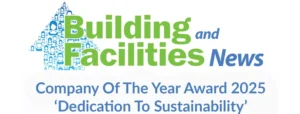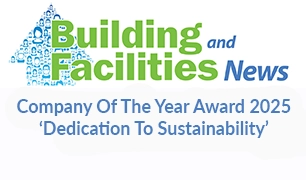Net Zero Water Heating
Net zero water heating focuses on introducing greater sustainability into commercial buildings through the implementation of Air Source Heat Pumps, Solar Thermal, Heat Recovery and supporting vessels for hybrid and electric-only applications.
With greenhouse gases predicted to reach record highs by 2023 and no sign of slowing, the warnings of the impact of global warming and climate crisis are increasingly becoming apparent to all. Addressing the fundamental issues of climate change has become a front and centre issue for UK businesses.
In 2008 the UK Government introduced the Climate Change Act legislating for change to reduce the UK’s greenhouse gas emissions by 80% by 2050 and then in 2019, increased the commitment to a 100% reduction which has come to be known as ‘Net Zero’.
‘Net Zero’ means that any emissions are balanced by absorbing an equivalent amount from the atmosphere. The Government current aggressive response is to drive positive movement across every sector to meet these goals, with a focus on domestic, commercial, transport, agriculture, and industrial usage across the UK.
Despite agreements which have committed the world to keeping the rise in global temperatures well below 2C above the pre-industrial levels, and efforts to keep them under 1.5C as we draw closer to 2023, the effects of global warming are undeniably present.
Most recently UK Met Office researchers have said that there is now around a 50/50 chance that the world will warm by more than 1.5C over the next five years. Predictions have already become reality, with the loss of sea ice, accelerated sea level rise, and extremes of weather including heavier rainfall and flooding, plus longer, more intense heat waves leading to drought and wildfires.
But, the world was amazed by the effects of COVID-19 lockdowns on the environment as the global pause rapidly led to positive improvements, surprising even scientists at how quickly the environment might bounce back if we truly met our 0% emissions goals.
Being net zero is about preserving the future of our planet. If, as a commercial business that sounds grandiose, then there are more business-centric advantages to be gained from adopting a more sustainable business regime beyond reducing the direct impact on business operations from climate extremes.
Technologies become more ‘net zero friendly’ because they primarily reduce dependency on fossil fuels. This reduction is achieved by either improving efficiency, thereby reducing fuel demands or by excising fossil fuels entirely. Both options provide a significant way to cut long term operational costs.
To achieve such savings does require capital investment in new applications or replacement appliances, so balancing capital costs against operational savings is an important consideration. Adding to that calculation though are a number of other positives including workforce and customer positivity around ‘greener’ brands.
Looking forward, proving an active sustainability strategy will also help meet mandated government policy and mitigate expected punitive fines for businesses that do not heed sustainability advice or make capital commitments to sustainability. Offsetting will no longer be an acceptable option.
The possibilities of making these goals achievable are very high, we can all make the smaller changes necessary to do so. However, change for the commercial sector comes with added complexity but also greater rewards. Heating and hot water have long been recognised as a key contributor to emissions from across the built environment. They of course are also rightly regarded as business-critical services.
Decreasing the use of fossil fuels to meet the ‘Net Zero’ goal seems obvious, and ‘simply’ changing to a more sustainable energy system can considerably reduce emissions.
But there are other key business considerations to take into consideration, with everything from running costs to capital investment required to modernise both building fabric and systems high on the agenda.
Building regulations also play a major role in decision making, and there remains considerable confusion over what ‘green’ technologies should be adopted and when. . .
Our name is derived from ‘Advantage Eco’, so it is fair to assume we firmly believe in the need for decarbonisation and the drive to attain Net Zero across the commercial environment before the 2050 deadline.
That said, we are also 50-year adherents of the value of deploying gas in commercial hot water applications. This is because of the necessary high temperatures required for safe operation and the cost-effective operation it offers businesses. Like the rest of the UK’s gas-based service market we have high hopes for the eventual introduction of green hydrogen-based alternatives to fossil gas, with potentially a much lower impact on existing infrastructure and simpler, more cost-effective like for like appliance replacement. But we also recognize the limitations of a hydrogen-centric viewpoint, not least in terms of achieving national distribution on the scale currently expected by gas users.
So, there must be real-world alternatives in play now if achieving Net Zero is going to become a commercial reality. From the proven capabilities of Solar Thermal systems supporting either gas or direct electric to low carbon air to waterside heat pumps and direct electric heating, there are clear paths of evolution open to organisations seeking to move onto the path to net zero.
Our experience as a specialist creator of hot water systems can help you as an organisation redefine the way your buildings consume energy and reduce your generation of harmful emissions without impacting critical offerings that define daily operation and the comfort and safety of staff and customers alike.
Talk to Adveco today about how our team can help design hot water and heating applications that remain cost-effective to build and operate for a better future.




Sustainable Net Zero Commercial Products
Adveco can help you achieve your Net Zero target by the year 2050 making your business sustainable for the future. Environmental sustainability can be achieved by improving efficiency for a calculable reduction in energy consumption. Reduce emissions, or completely remove from estate buildings. And / or to adapt existing systems with low carbon or a hybrid system that economically bridges future sustainable technologies. Adopting a Net Zero water heating strategy is a relatively simple and often much lower-cost means of implementing early steps towards a more sustainable business model.

Air Source Heat Pumps
For new buildings across the campus that are serviced by electricity only, the deployment of air source heat pumps (ASHP) as a method of pre-heating water represent a clear opportunity to introduce low carbon technology to meet sustainability goals.
Read more about the advantages and challenges of using ASHPs for net zero water heating applications in estate buildings…
Solar Thermal
A proven and extremely reliable technology, solar thermal offers a clear path to reducing CO₂ emissions as part of a net zero water heating implementation.
Correctly designed and sized to the application, such as student accommodation, solar thermal systems can generate a considerable proportion of the hot water requirements for buildings that are already on-gas with relatively short payback periods on the initial capital expenditure, while leveraging lower-cost gas to meet peak demands.
Read more about the advantages and challenges of Solar Thermal hot water applications for student accommodation blocks…
Our Hydrogen Future
Hydrogen is a versatile, clean-burning fuel that produces only water and heat when burned. It has the potential to play a key role in the transition to a low-carbon economy, particularly in industries that are currently reliant on fossil fuels, such as the commercial heating and hot water sector.
Opting to use hydrogen to decarbonise comes with a number of potential advantages, especially for those organisations with higher energy demands and currently on gas. It could provide an energy source almost as cost-effective as natural gas, and cheaper than direct electric systems, as well as deliver a clear investment in sustainability which natural gas, a fossil fuel, does not.
Given the equipment for hydrogen remains familiar to operate and manage, and does not require major refitting of system components such as heat emitters capital costs should remain lower, while decarbonisation can be accelerated within a property.
For those desiring to adopt the hydrogen approach, there remains a question mark over how quickly, where and in what proportion hydrogen will be introduced into the gas grid. The ultimate aim is to introduce 100% green hydrogen via the existing gas network. As an interim, the UK is assessing the potential for introducing hydrogen into the existing gas network as a blend at 20% volume to deliver a safer, greener gas alternative that reduces carbon emissions.
Adveco’s current ranges of high efficiency, ultra-low emission gas-fired condensing water heater, the instantaneous ADplus and semi-instantaneous AD, as well as the MD boiler range, are all hydrogen 20% blend ready and able to burn natural gas with a blend of up to 20% hydrogen without requiring any modification. These give customers peace of mind when investing in gas-fired water heating applications, helping to bridge the gap to when next-generation net zero water heating technologies are widely available…

Packaged Plant Rooms
Creating a modern, efficient, cost-effective, and sustainable net zero water heating system is not always straightforward for some sites. They may be limited in terms of existing plant room space or, in the case of much older buildings, have no dedicated plant room space at all. Other sites may face limitations in terms of when work can actually be carried out on-site. If a works window is especially narrow it can preclude larger scale project work.
Packaged Plant Rooms provide robust enclosures containing a pre-built water heating system suitable for placement beside or on top of buildings with a flat roof space. By integrating and combining gas, electric and low carbon technologies including ASHP, into a single packaged hybrid system also provides a timely answer to meeting new sustainability targets while future-proofing the system for integration with new energy sources, such as green gas and hydrogen. When delivered to the project location, the plant room module can be easily sited, requiring just external pipework and final electrical connections to be completed.
This approach enables organisations to Improve the sustainability of a building by relocating essential services and also maximising space, whilst protecting net zero project timescales. Because the system construction is created offsite, the quality and speed of works also improve…
Net Zero News
Building And Facilities News Bestows Its Company of The Year Award on Adveco For Advancing Building Sustainability In The UK
Sustainability And The UK’s Spending Review
Sustainability Targets & The Transition To Low Carbon Water Heating
Read The Adveco June 2025 Newsletter
Is the Race For Sustainability Superseding Safety?
Ask Adveco? Sustainability and Regulation Challenges For Water Heating
Adveco Wins Award For Innovation In Retrofit
Read The Adveco May 2025 Newsletter
Is Carbon Negative Water Heating Achievable?




























